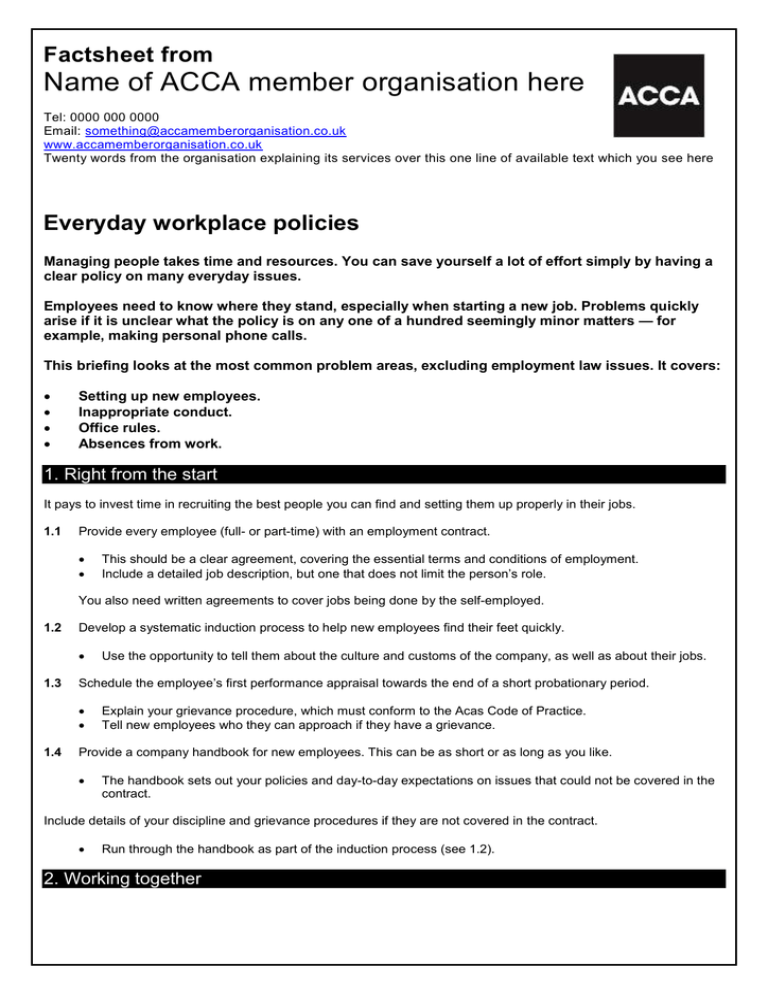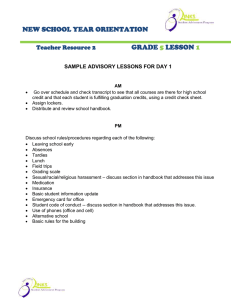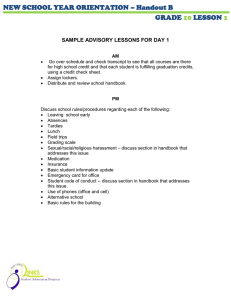
Factsheet from
Name of ACCA member organisation here
Tel: 0000 000 0000
Email: something@accamemberorganisation.co.uk
www.accamemberorganisation.co.uk
Twenty words from the organisation explaining its services over this one line of available text which you see here
Everyday workplace policies
Managing people takes time and resources. You can save yourself a lot of effort simply by having a
clear policy on many everyday issues.
Employees need to know where they stand, especially when starting a new job. Problems quickly
arise if it is unclear what the policy is on any one of a hundred seemingly minor matters — for
example, making personal phone calls.
This briefing looks at the most common problem areas, excluding employment law issues. It covers:
Setting up new employees.
Inappropriate conduct.
Office rules.
Absences from work.
1. Right from the start
It pays to invest time in recruiting the best people you can find and setting them up properly in their jobs.
1.1
Provide every employee (full- or part-time) with an employment contract.
This should be a clear agreement, covering the essential terms and conditions of employment.
Include a detailed job description, but one that does not limit the person’s role.
You also need written agreements to cover jobs being done by the self-employed.
1.2
Develop a systematic induction process to help new employees find their feet quickly.
1.3
Schedule the employee’s first performance appraisal towards the end of a short probationary period.
1.4
Use the opportunity to tell them about the culture and customs of the company, as well as about their jobs.
Explain your grievance procedure, which must conform to the Acas Code of Practice.
Tell new employees who they can approach if they have a grievance.
Provide a company handbook for new employees. This can be as short or as long as you like.
The handbook sets out your policies and day-to-day expectations on issues that could not be covered in the
contract.
Include details of your discipline and grievance procedures if they are not covered in the contract.
Run through the handbook as part of the induction process (see 1.2).
2. Working together
2.1
Clarify who does what in the team, to avoid misunderstandings.
Create a fair division of labour for chores.
For example, making cups of tea (for colleagues and visitors) can become a bone of contention if it is left to chance. It
is often minor issues like this that most undermine teamwork.
2.2
Even if you have a receptionist, make it plain that everyone is expected to pick up the phone after a certain
number of rings.
Include telephone training as part of the induction process (see 1.2).
Train all employees how to handle enquiries, take and pass on messages and transfer calls.
3. Inappropriate conduct
3.1
State your position on antisocial behaviour.
3.2
Make persistent rudeness, lewdness or swearing disciplinary offences.
Explain that all employees are expected to dress in ways that are appropriate to the working environment, and to
maintain reasonable standards of hygiene.
If protective clothing is necessary, supply it and make sure it is worn.
If it is important that some employees, such as frontline staff, present a smart appearance, spell this out.
Do not discriminate. If it is important for men to dress formally, it is important for women doing the same or
equivalent work to do likewise.
3.3
Theft, fraud, violence and the possession or use of drugs are usually regarded as gross misconduct.
In these cases, consider suspending the offender on full pay while you investigate the incident.
You should follow the Acas Code of Practice which sets out 'fair and reasonable' procedures.
4. Workplace rules
4.1
Decide on a realistic policy on receiving personal phone calls, given the circumstances of your business.
4.2
Discourage employees from making personal calls, and ban international calls.
4.3
Explain that you make a point of periodically analysing outgoing phone calls and personal use can be
quantified. (You can get itemised bills from your telecoms supplier, listing your most called numbers.)
Mobile phones are wide open to abuse, so you may need to set usage limits. The use of phonecards and
telephone charge cards can help keep mobile phone bills down.
Be careful about monitoring calls. You may fall foul of data protection laws.
You may need to limit personal visitors.
4.4
There are some situations where stopping to take a call would be seriously disruptive. For example, on a
production line.
In less clear-cut cases, tell employees that they should keep personal calls to a reasonable minimum.
Visitors should stay in the reception area, unless the employee has permission to show them around.
Whether or not your firm is active online and in social media, your employees probably are. Establish a policy on
the use of social media and personal use of email and the internet.
2
Include a social media policy that, at the very least, makes clear that employees cannot criticise the firm, its
clients, products or any other worker online, even in their own time. Remind employees of their confidentiality
agreement and stress that they must behave appropriately both face to face and onscreen.
Personal email not only takes up time, but takes up space on the computer server, too.
The company may be liable for anything downloaded from the Internet such as copyright material which
could attract charges.
4.5
Do not let people use their own software or connect to computer games in the office.
4.6
Communicate your smoking policy.
4.7
All enclosed workplaces in the UK are required to be smoke free. This includes company cars and vans.
Indoor smoking rooms are no longer allowed and all enclosed workplaces must display no-smoking signs.
Establish a policy on employees’ use of their own cars for company business.
Insurance can be a problem, so some firms ban the use of private cars for company business. Take advice
from your broker.
Ask employees to confirm, in writing, that their private insurance covers them for business use.
5. Holidays
5.1
Decide how holiday dates are to be allocated, and how you are going to provide for cover during holiday periods.
5.2
Most companies work on a ‘first come, first served’ system.
Many companies put a limit of, for example, two weeks on the amount of holiday that can normally be taken
at any one time.
Set out your position on holiday rollovers.
For example, you might stipulate that no more than one week of unused holiday can be rolled over into the
next year.
5.3
Establish policies on bank holidays and time off in lieu.
5.4
Make it clear that employees need permission to take any unpaid leave.
Any extensions to time away from the workplace should be agreed in advance.
There may be tax implications if an employee adds a week’s holiday to an overseas business trip.
6. Lateness and absence
6.1
If you keep standardised working hours, make it plain that persistent lateness is a disciplinary issue.
6.2
You cannot expect people to come to work if they are genuinely ill. But you can decide how much you are going
to pay them, beyond the limits of statutory sick pay.
6.3
Stipulate that employees must let you know if they are going to be late, and must report to their managers on
arrival.
You may want to set a limit on the number of days for which you provide full pay, but make exceptions where
appropriate.
Have a policy of monitoring absences and issue warnings to employees as soon as the level becomes
unacceptable.
Set out your policy on leave and pay for maternity, paternity and adoptive parents, conforming to legal
requirements.
3
6.4
All employees have a legal right to dependant care leave.
6.5
Workers can take ‘reasonable’ unpaid time off to deal with an emergency involving a dependant.
With the illness or death of relatives, it will pay to be compassionate.
Decide your policy on absences due to domestic problems.
6.6
Employees are also entitled to unpaid parental leave.
Be realistic. People in the throes of major marital crises are likely to feel their own problems must take
priority over work.
More minor domestic problems, such as a burst water pipe at home, may also require employees to take
time off.
You will also need a policy on jury service.
You may want to continue paying people, though the law does not oblige you to.
Set a limit, or you could find yourself part-financing a six-month fraud trial. Many companies pay people for two weeks.
6.7
It is illegal to subject employees to any detriment if they accept a call to jury service.
There are other reasons why people may have absences from work, such as Volunteer Reserve Service within
the Army (TA), Navy, or Royal Marines, alongside being a Magistrate or School Governor.
Ensure you have a policy to cover such absences.
7. Expenses and theft
Nip potential problems in the bud with clear policies about dishonest behaviour.
7.1
Lay down rules about the type and scale of business expenses employees can claim.
7.2
Emphasise that expenses claims will be checked. Make it clear that falsifying claims is theft and therefore a
sackable offence.
7.3
What are the guidelines for meals, overnight accommodation and travel?
What other expenses are allowable while out of the office?
What can be spent on client entertainment?
What restrictions are there on the use of a company credit card?
Insist on receipts as proof of expenditure (and for VAT purposes).
All expenses should be signed off by the employee’s line manager.
Take steps to prevent petty theft.
Give one person responsibility for the most likely targets — stationery, stamps and use of the franking
machine for personal post.
Keep a detailed register of assets, including the serial number of each item and details of who is responsible
for it.
Decide what can be taken out of the office (eg portable computers) and any procedures that must be followed.
Make it clear that police will be involved in investigating any valuable missing stock.
8. Confidentiality
8.1
Divulging commercially significant trade secrets to a competitor, even unwittingly, could be grounds for dismissal.
4
8.2
If you want people to be careful about sensitive information, explain the need for discretion.
8.3
Consider restricting such information to the people who need to know.
Make confidentiality about your business, products and services, clients, customers and other employees a
requirement for all staff using social media either at home or at work.
Otherwise, junior finance assistants, for example, might inadvertently mention your business’ cash problems
to suppliers.
Decide which types of information must be kept in locked cabinets. For example, personnel files and payroll
details.
9. Departures
Do not wait until someone leaves before you explain the procedures involved. Do it on day one, preferably in a
company handbook, alongside the other key information in 2–9.
9.1
Keep notice periods as short as possible.
9.2
There should be a job handover where appropriate, especially if the employee is leaving on good terms.
9.3
Get leavers to use the last few weeks to create ‘job packs’ for their successors, listing important contacts and
information.
Use a standard checklist to identify all the company property that must be returned.
9.4
Consider how long it would take you to find and train a replacement.
Even the most conscientious people will be gone, in spirit, if not in body, once they have given in their notice.
In cases of redundancy or dismissal, it is common for employees to leave straight away and receive pay in
lieu of notice.
For example, keys, credit card, security pass, car, laptop and mobile phone.
Except when someone retires, there is no reason for the company to contribute to a gift for a departing
employee.
Disciplinary procedure
Acas issues the Code of Practice on discipline and grievance outlining what is considered ‘fair and reasonable’
behaviour when dealing with problems in the workplace. Unreasonable failure to follow the Code can result in an
employment tribunal increasing any tribunal awards by 25 per cent.
Employers and employees should attempt to resolve any disputes informally – and perhaps through mediation – before
instigating formal procedures. However, where this does not resolve the issue you should ensure your procedures are
fair and transparent.
A.
Investigate the facts.
B.
If there is a case to answer, you should write to the employee concerned explaining what the problem is.
C.
Hold a face-to-face meeting to discuss the problem.
Employees have the right to be accompanied by a colleague or trade union representative.
D.
Decide on appropriate action.
E.
Give the employee an opportunity to appeal against the finding.
5
Experts’ quotes
“A policy is a framework which makes people feel safe, especially when they start a new job.”
Simon Macaulay,
Anglo Felt Industries
“It is essential that managers are familiar with the policies of the organisation. Failure to apply them could lead to
claims of Breach of Contract.”
Jim Givens,
HR Management Solutions
Expert contributors
Thanks to Simon Macaulay (Anglo Felt Industries, 01706 853513); Amanda Galashan (EmployEase, 020 7831 5052);
Jim Givens (HR Management Solutions, 01695 421980, www.humanresourcesclick.net).
Last updated 01.12.11
© BHP Information Solutions 2011. ISSN 1369-1996. All rights reserved. No part of this publication may be reproduced or transmitted without the
written permission of the publisher. This publication is for general guidance only. The publisher, expert contributors and distributor disclaim all liability
for any errors or omissions. Consult your local business support organisation or your professional adviser for help and advice.
6




